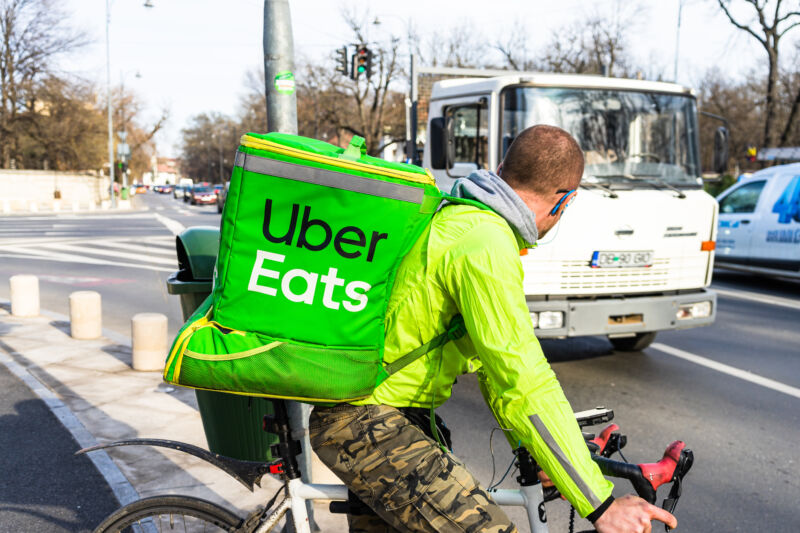Uber’s attempt to buy Grubhub comes under fire

An attempt by Uber to build the largest meal delivery company in the US by buying its rival Grubhub has immediately come under fire from lawmakers, city officials, and antitrust experts.
Uber and Grubhub, currently the second and third-largest US meal delivery companies by market share behind DoorDash, are in talks over a tie-up as the coronavirus crisis accelerates consumer demand for delivery services, according to two people familiar with the situation. Grubhub’s share price rose 29 percent on Tuesday, giving it a market value of $5.5 billion.
David Cicilline, a congressman who chairs the House antitrust subcommittee investigating the tech sector, said Uber’s takeover attempt “marks a new low in pandemic profiteering.”
“Uber is a notoriously predatory company that has long denied its drivers a living wage,” he said, while noting that Grubhub “has a history of exploiting local restaurants through deceptive tactics and extortionate fees.”
Analysts at Wedbush estimated that the combination of Uber Eats and Grubhub would have about 55 percent of the US meal delivery market, with DoorDash having 35 percent.
While meal delivery appears to be more competitive than ride-hailing, where Uber has 70 percent of the market to Lyft’s 30 percent, the proposed deal would have a dramatic impact at local level.
According to data from analytics firm Second Measure, Uber’s market share in New York City, for example, would grow from about 17 percent to just under 80 percent.
“I’m wondering what kinds of arguments [Uber is] going to make about consumer benefit,” said Professor William Kovacic, a former chair of the US Federal Trade Commission. “How is this better for the citizens in New York City? I think [regulators] will very keenly focus on that.”
If New York—or any other state—is unhappy with the proposed deal, it could seek an injunction to block it, as happened with the recent merger between networks T-Mobile and Sprint. The office of New York state attorney-general Letitia James declined to comment on the Uber-Grubhub reports on Tuesday.
“I think Uber can expect a very close look,” Prof Kovacic said, “because these providers are now such an integral part of the service infrastructure of these areas in which they do business.”
In defense of a deal, Uber and Grubhub may choose to argue that Grubhub would not be able to survive out on its own, given the spending required to compete in the ultra-competitive food delivery business—the so-called “failing firm” defense.
Such an argument succeeded recently in the UK, where the Competition and Markets Authority approved an investment by Amazon in delivery service Deliveroo on the basis that coronavirus-related pressures meant Deliveroo “would fail financially and exit the market” otherwise.
But Mark McCareins, a professor at Northwestern University’s Kellogg School of Management, said he was “not too optimistic” that US officials would buy the same argument. “I haven’t seen the [US] government make any sort of pronouncements that they’re cutting special deals and merger enforcement in light of the pandemic.”
Meanwhile, local officials are already concerned about the power of food delivery companies to charge high fees to the restaurants on their platforms.
The cut taken varies but is typically about 30 percent, a level that restaurants complain is unworkable but unavoidable with their premises shut by coronavirus lockdowns.
In San Francisco, the mayor, London Breed, instituted a 15 percent cap on commission fees, a move that prompted Uber to suspend deliveries to Treasure Island, which sits in the bay separating San Francisco and nearby Oakland and is home to a number of low-income residents.
In Jersey City, Uber reacted with a $3 surcharge to consumers after the city’s mayor imposed a 10 percent commission cap. In Chicago, an order due to come into force later this month will not force a cap but instead demand transparency on fees so customers have a clear picture of how much of their payment goes to restaurants.
New York City is poised to move next: a bill seeking to impose a 20 percent cap is on the table this week, supported by the mayor, Bill de Blasio, and gaining momentum following news of the possible Grubhub deal.
“We’re concerned about what this is going to mean for the future and the viability of our restaurants,” said councilman Mark Gjonaj, chair of New York City’s committee for small business, and co-sponsor of the bill. “Now more than ever, it’s important how we protect an industry when you have no other option but pick up a delivery.”
Food delivery companies have jointly opposed the commission caps, arguing that critics do not take into consideration the costs of both attracting orders and fulfilling deliveries.
“There is a misunderstanding, at least from some policymakers, around the fact that a company like Uber Eats isn’t just a lead generation service,” Pierre-Dimitri Gore-Coty, head of Uber Eats, told the Financial Times.
“There is a lot of skepticism out there about the path to profitability that we are on. I’m quite convinced that the model can actually be profitable without having to take more from restaurants.”
© 2020 The Financial Times Ltd. All rights reserved. Not to be redistributed, copied, or modified in any way.
https://arstechnica.com/?p=1675446